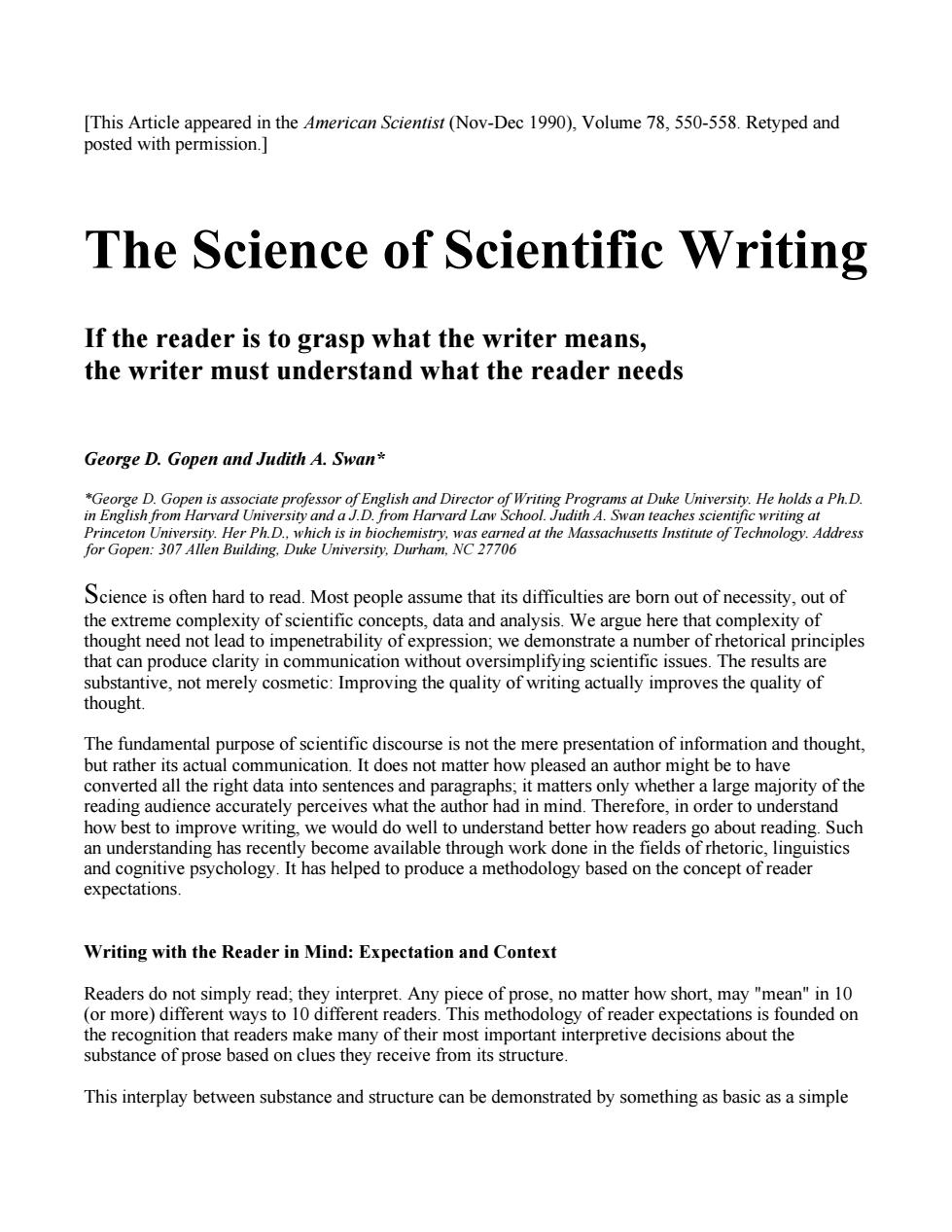正在加载图片...

[This Article appeared in the American Scientist (Nov-Dec 1990),Volume 78,550-558.Retyped and posted with permission.] The Science of Scientific Writing If the reader is to grasp what the writer means, the writer must understand what the reader needs George D.Gopen and Judith A.Swan* *George D.Gopen is associate professor of English and Director of Writing Programs at Duke University.He holds a Ph.D. in English from Harvard University and a J.D.from Harvard Law School.Judith A.Swan teaches scientific writing at Princeton University.Her Ph.D..which is in biochemistry,was earned at the Massachusetts Institute of Technology.Address for Gopen:307 Allen Building,Duke University,Durham,NC 27706 Science is often hard to read.Most people assume that its difficulties are born out of necessity,out of the extreme complexity of scientific concepts,data and analysis.We argue here that complexity of thought need not lead to impenetrability of expression;we demonstrate a number of rhetorical principles that can produce clarity in communication without oversimplifying scientific issues.The results are substantive,not merely cosmetic:Improving the quality of writing actually improves the quality of thought The fundamental purpose of scientific discourse is not the mere presentation of information and thought, but rather its actual communication.It does not matter how pleased an author might be to have converted all the right data into sentences and paragraphs;it matters only whether a large majority of the reading audience accurately perceives what the author had in mind.Therefore,in order to understand how best to improve writing,we would do well to understand better how readers go about reading.Such an understanding has recently become available through work done in the fields of rhetoric,linguistics and cognitive psychology.It has helped to produce a methodology based on the concept of reader expectations. Writing with the Reader in Mind:Expectation and Context Readers do not simply read;they interpret.Any piece of prose,no matter how short,may "mean"in 10 (or more)different ways to 10 different readers.This methodology of reader expectations is founded on the recognition that readers make many of their most important interpretive decisions about the substance of prose based on clues they receive from its structure. This interplay between substance and structure can be demonstrated by something as basic as a simple[This Article appeared in the American Scientist (Nov-Dec 1990), Volume 78, 550-558. Retyped and posted with permission.] The Science of Scientific Writing If the reader is to grasp what the writer means, the writer must understand what the reader needs George D. Gopen and Judith A. Swan* *George D. Gopen is associate professor of English and Director of Writing Programs at Duke University. He holds a Ph.D. in English from Harvard University and a J.D. from Harvard Law School. Judith A. Swan teaches scientific writing at Princeton University. Her Ph.D., which is in biochemistry, was earned at the Massachusetts Institute of Technology. Address for Gopen: 307 Allen Building, Duke University, Durham, NC 27706 Science is often hard to read. Most people assume that its difficulties are born out of necessity, out of the extreme complexity of scientific concepts, data and analysis. We argue here that complexity of thought need not lead to impenetrability of expression; we demonstrate a number of rhetorical principles that can produce clarity in communication without oversimplifying scientific issues. The results are substantive, not merely cosmetic: Improving the quality of writing actually improves the quality of thought. The fundamental purpose of scientific discourse is not the mere presentation of information and thought, but rather its actual communication. It does not matter how pleased an author might be to have converted all the right data into sentences and paragraphs; it matters only whether a large majority of the reading audience accurately perceives what the author had in mind. Therefore, in order to understand how best to improve writing, we would do well to understand better how readers go about reading. Such an understanding has recently become available through work done in the fields of rhetoric, linguistics and cognitive psychology. It has helped to produce a methodology based on the concept of reader expectations. Writing with the Reader in Mind: Expectation and Context Readers do not simply read; they interpret. Any piece of prose, no matter how short, may "mean" in 10 (or more) different ways to 10 different readers. This methodology of reader expectations is founded on the recognition that readers make many of their most important interpretive decisions about the substance of prose based on clues they receive from its structure. This interplay between substance and structure can be demonstrated by something as basic as a simple